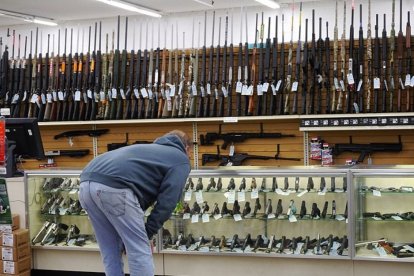Federal judge dismisses lawsuit from Mexico blaming US gun manufacturers for violence in the country
A similar lawsuit had already been dismissed in 2022, but the Mexican government insists on blaming American gun producers for crime in the country.

Gun store
A federal judge in Boston dismissed on Wednesday the $10 billion lawsuit that Mexico filed against several U.S. gun manufacturers in 2021.
In the brief, the Mexican government claimed that seven gun manufacturers (Smith & Wesson, Beretta, Colt, Glock, Century Arms, Ruger and Barrett and the seller and distributor Interstate Arms) were partly responsible for the criminal violence in its territory.
Specifically, the lawsuit said, these Massachusetts-based manufacturers sold weapons to drug cartels who then used them in their crimes, and therefore Mexico asked them to assume their share of the blame.
However, three years later, The Guardian reports that Judge Dennis Saylor said the lawsuit "lacked sufficient evidence to establish jurisdiction" and, most importantly, he asserted that it could not be proven that the crime in Mexico arose from business transactions between Massachusetts gun manufacturers and drug cartels, but that the companies' connection to the state is "gossamer-thin at best."
Another lawsuit was already dismissed in 2022, but the Mexican government filed new legal action in an attempt to hold gun manufacturers accountable. It did not go forward, since none of the six gun manufacturers listed in the brief are incorporated in the state.
The lawsuit against Smith & Wesson as well as distributor Interstate Arms remain in effect. Both companies should respond to the complaint filed by the Mexican government, which is still ongoing.
This was assured by the Mexican Foreign Ministry through a statement published on X, claiming that "this decision neither affects the case against these two companies nor excludes the other six companies from civil liability. Legal actions against these six companies are ongoing."
The Mexican Foreign Ministry also assured that it intends to hold the rest of the companies responsible for collaborating in organized crime in their country, even going so far as to consider "a possible appeal or resorting to other federal courts in the U.S."
RECOMMENDATION





















